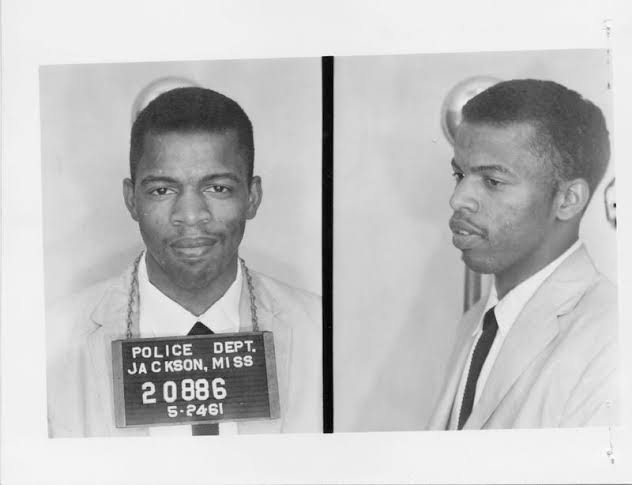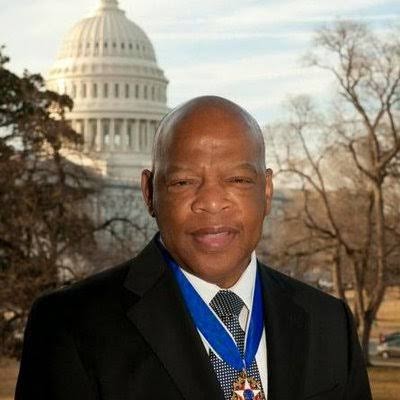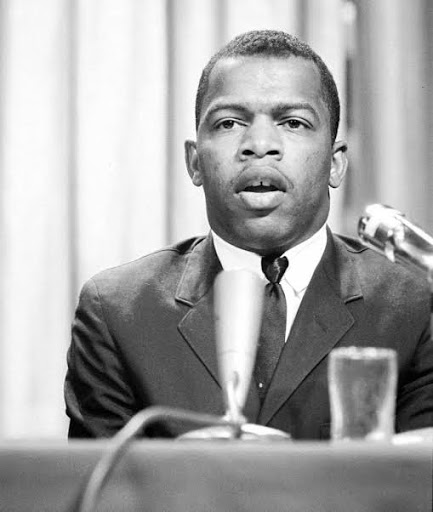John Lewis was a man, who like many others, was inspired by the words of Martin Luther King, oftentimes listening to his words as they broadcasted on a radio gospel program led by King himself. He was stirred by King’s passionate words, his ability to speak on racial injustice and his continuous efforts in fighting against it through peaceful protest. This and the Montgomery Bus Boycott lit a fire in Lewis that would continue to burn and set alight events that would change the history of civil rights movements and African Americans as the world knew it.
Born February 14, 1940 near Troy, Alabama to parents Willie Mae and Eddie Lewis, who were sharecroppers, John Robert Lewis grew up with 9 brothers and sisters.
Early on, John was set on making change, on being an avid voice in the undying outcry of African Americans against segregation, and gained experience in public speaking by preaching in local churches.
In 1957, John left Alabama to attend the American Baptist theological seminary in Nashville and later enrolled in Frisk University. There, he got his first taste of action, where he organized sit-ins and demonstrations for the Nashville Student Movement that fought against the segregation of lunch counters.
At these very sit ins is where John would experience his first arrest.

Days after their non-violent sit-ins, the participants were arrested for misconduct. They refused to pay the fine ,and instead chose to serve their sentence in the county workhouse. Lewis’ and many others’ actions gathered media attention and made way for Nashville to be the first major Southern state to desegregate public facilities.
From then John became a member of the Freedom Riders in 1961. Freedom Riders were a group of civil rights activists organized by the Congress of Racial Inequality who participated in bus trips in the American South protesting against segregated bus terminals and “white-only” restrooms after the Supreme Court declared that all segregation in interstate bus depots and busses illegal. The Freedom Riders were one of the most influential civil rights activist groups and gathered much attention from the police, oftentimes being involved in arrests and beatings, despite their protests being peaceful, and Lewis was caught in the middle on multiple occasions.
Following his involvement in the Freedom Riders, in 1963, John was voted the chairman of the Student Nonviolent Coordinating Committee (SNCC), a radical new voice aimed at giving the youth a chance to involve and make change in the civil rights movements, moving them up the ranks and allowing them to take part in leadership roles.
He soon became one of the “Big Six” leaders of the civil rights movement, alongside Martin Luther King, James Farmer, A. Philip Randolph, Roy Wilkins and Whitney Young, and organized one of the most historical marches, the March on Washington,a peaceful protest, gathering around 250,000 people, where Martin Luther King gave his iconic “I Have A Dream” speech.
The March focused on the civil and economic rights, joblessness and the voting rights, or the lack thereof, of African Americans.
Although King was the headliner, Lewis, only 23 at the time, spoke at the scene as well ,saying “As it stands now, the voting section of this bill will not help the thousands of black people who want to vote. It will not help the citizens of Mississippi, of Alabama and Georgia, who are qualified to vote, but lack a sixth-grade education. “One man, one vote” is the African cry. It is ours too. It must be ours!” finishing with a riveting “We must say Wake up America! Wake up! For we cannot stop, and we will not and cannot be patient.”
After the march on Washington the Civil Rights Act became law but it didn’t open many doors for African Americans to vote in the South. In light of this the SNCC led a voting registration campaign in Selma, Alabama, who had a history in resisting the rights of black voters. After receiving unfailing resistance from law enforcement, Martin Luther King Jr and the Southern Christian Leadership Conference (SCLC) decided to make the resistance of Selma to black voting rights a national concern.
During one of their demonstrations, on February 18, a protester by the name of Jimmy Lee Jackson was shot and killed by a state trooper, this would lead to a protest march from Selma to Montgomery which would come to be known as Bloody Sunday, an event that John Lewis said to have altered the path of his life forever.
On Sunday, March 7, six hundred protesters assembled in Selma, led by John Lewis, crossing the Edmund Pettus Bridge over Alabama river on the way to Montgomery. On the way across, their path was blocked by state troopers and marchers were told to disperse and make their way back and when they refused, were faced by a full-on advance.
Marchers were teargassed, ran over by horses, spat on and were attacked by billy clubs and bullwhips. More than 50 marchers were hospitalized and Lewis was beaten so severely that he suffered a fractured skull.
This brutal and blatant attack was recorded and televised on ABC news and racked up nearly 50 million views. The events being broadcasted and actions of the state troopers were compared to that of Nazi storm troopers pressing on the direness and inescapable turn of events being witnessed.
The events in Selma caused outrage across the country. Actions were taken. Sit-ins, blockades and demonstrations were organized. But change came, late as it was, on August 6,1965 the Voting Rights Act was passed by President Johnson.
Lewis did not stop there, even after leaving the SNCC in 1966, he continued being an active contributor to the civil rights movement. He joined and became associate director of the Field Foundation and continued to do one of his greatest works as the third executive director of the Voters Education Project (VEP).
During his time in VEP Lewis not only focused on the liberation and aiding in financial support of African Americans but also to the less fortunate and minorities in the country. He was known for transforming the VEP to an activist organization contributing largely to its growth and success.
In 1967, Lewis met Lillian Miles Lewis, a librarian at Atlanta University,who would later become his wife, at a New Year’s Eve party. They married in 1968 and in his autobiography “Walking with The Wind” Lewis talks about the impact his wife had and her guidance in his involvement in politics. They adopted one son, John-Miles Lewis.
John Lewis stayed on with the VEP until 1977 where he resigned to run for U.S congress. During his first campaign, Lewis was not successful, but went on to win a place on the Atlanta City Council in 1981, four years later. In the following years Lewis continued to give back to the community but was oddly quiet and uneventful during his stay in the council.
In 1986, he ran for congress again, this time winning 52 to 48 percent against State Senator Julian Bond for Georgia’s 5th congressional district. He was the second African American congressman to represent the state of Georgia after the reconstruction.
A pillar in the civil rights movement, Lewis remained in congress from 1987 until his passing on June 17, 2020 after being diagnosed with pancreatic cancer in 2019. During his time, Lewis remained an unsilenced and unformidable force, referred to as the “Conscience of the United States Congress”, by former President of The United States, Barack Obama during a ceremony where Lewis was awarded the Presidential Medal of Freedom in 2011. His work mainly focused on voting rights and the spread of availability and more access to polls to the public, mainly the POC community.
John Robert Lewis was a courageous and intrepid man, the last survivor of the Big Six, and without his work on the civil rights movement, America would not be the country it is today. He risked his life, with no regard for his well being, on multiple occasions, being arrested a staggering 45 times in the name of the desegregation and rights of his people. He lived on the front lines of the civil rights movements, refusing to give up his value’s and continuing as a non-violent protest despite his multiple physical altercations with police force.
After his passing Lewis was buried next to his wife, Lillian Miles Lewis, who passed away on December 31, 2012, at Southview Cemetery.
Fondly called “The boy from Troy” by Martin Luther King Jr, Lewis grew from a preacher at local churches to having met his heroes, to having been the hero of thousands of African Americans today and he will be fondly remembered for years to come as, not only an activist, but as a leader and as an inspiration that would light, in others, the same flames that kindled within him till the day he passed.
“[Lewis] loved this country so much that he risked his life and his blood so that it might live up to its promise” -Barack Obama
“He bled to ‘make America great’” -Atlanta Mayor Kasim Reed.

